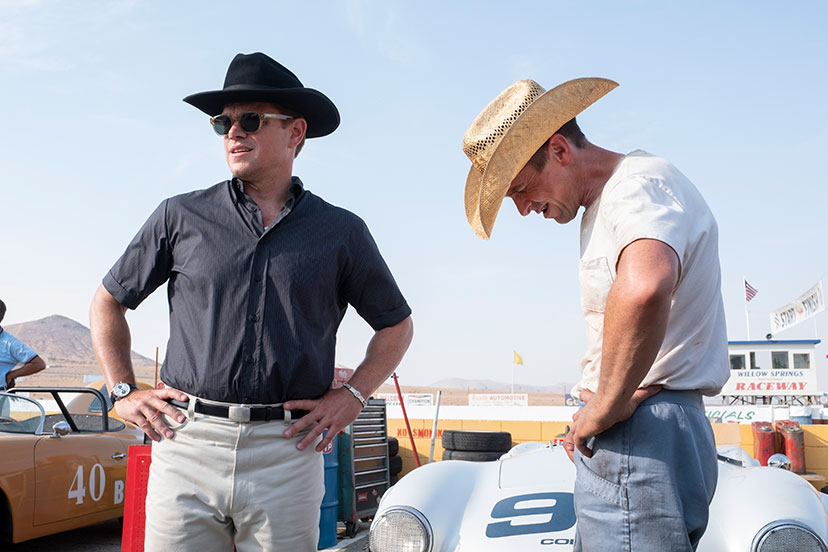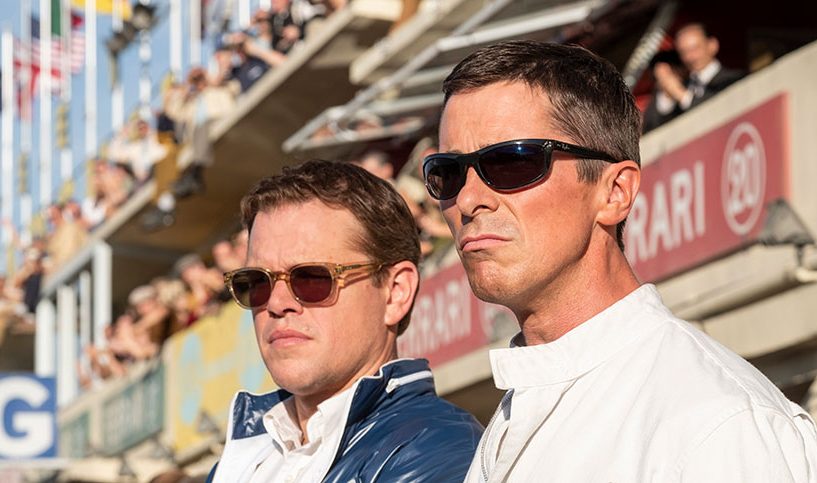When Caroll Shelby, American automotive genius designer teamed up with fearless British race car driver Ken Miles they knew they could beat Enzo Ferrari’s race cars in the 24 Hours of Le Mans in France in 1966. But that was far from their only opponent or obstacle.
They first had to get past the laws of physics, inner demons and corporate bureaucracy. At the heart of this classic story of bravery, trust and sheer risk in the pursuit of perfection is a pairing for the ages: the complementary driving forces of Matt Damon and Christian Bale…
This is a fascinating story of an unlikely friendship – of great highs and lows and being there for each other. What did you know of the story and of your characters before going in?
BALE: “I knew nothing about him, and I think I’m probably in the same boat as most people on that. He’s very much an unsung hero of motor-racing. He was a very English man, from the Midlands in Britain. Before racing, he was a military man, served in a tank unit. He was there, I think, D-Day plus two or three days after, then went across Europe. He was there when they liberated Belsen. Then he became an absolute, pure, racer’s racer, very strong-minded, incredibly passionate about what he did. Within the motor-racing circuit, you hear many stories about him, about that race in ’66, but they were all new to me.”
DAMON: “There had been different iterations of this [project] around for about 10 years, so I was familiar with the story. But it wasn’t until I read this version, with this group of people, like Jim [Mangold] and Christian attached that I got really sold. So, then I really started to watch documentaries about Shelby and reading about him. I also talked to a lot of people because a lot of people knew him socially – he cut quite a figure out here in LA! And put it this way, he was described to me, by many people, as a man who could sell you anything.”
What was different about this version of the story that made you sign on?
DAMON: “It’s such an amazing story, but none of the takes before distilled it down in the way that this one did, in a way that a lot of people will be able to relate to. There had been versions emphasizing the whole group of drivers and engineers and there were other versions that I thought might have been told in a longer way, maybe over 10 episodes on TV. But for a feature, two-and-a-half hours, three acts, I hadn’t seen a script that had quite captured the essence of this incredible story. And this distillation of the story down to the two guys, down to this friendship between Miles and Shelby, I thought was just the perfect way in. It was also really relatable because it showed the universality of this friendship. Theirs is a classic underdog story. These two guys were so different in some ways but cared about the same things – the most important things – so they formed this bond that allowed them to be better than the sum of their parts. They fought like brothers, could drive each other pretty crazy, drive each other up the wall – which is something I think a lot of people can relate to! – but they also came together to achieve real greatness.”
Christian, are you proud to finally bring Ken’s story out into the wider world?
BALE: “Yes, but I also don’t think that this was a man who was doing it for the fame. I think that’s what made him so admired by the racers – that he did it just for that purity. He was inducted into the [racing] Hall of Fame already, and I think he would have been very happy being a man that the people in the racing world know who he is. So, I suspect that he felt that he got recognition. In my mind, I never would have viewed him as somebody who was longing for anything more.”
Your character, Matt, stakes everything on a friend. How did you work together to build that same level of trust on screen?
DAMON: “Look, he’s one of the best actors I’ve ever seen. So, in some ways, it was very easy to relate to the way that Shelby felt about Miles, because Shelby felt that Miles was the best engineer and driver that he had ever seen. In that sense, it was easy. With Christian, there is a kind of monk-like dedication that he has to his work. For him, you didn’t need to know how hard he was working, or what he was giving up, or what the sacrifices were. That sums him up, really, this tremendous dedication to his work. And Ken Miles was like that, too. Miles didn’t suffer fools; he was a very serious guy about what he did. Christian shares so many of those qualities. He’s a purist in many ways and very serious about what he does. In that sense, it didn’t require much acting from me at all!”
BALE: “You know what, I’ve been doing this for, like, 30 years, and I’m still none the wiser. I’m really not! I don’t know how it’s done exactly. Sometimes it works, sometimes it doesn’t. Why it works sometimes and doesn’t others? I don’t really have an answer for you. Sometimes it just works and sometimes it doesn’t. And I feel that this time it did. Matt is a great actor. And he’s also got such a great understanding of the cameras, the lenses. He has a totally different approach to me. Probably a more comprehensive and intelligent approach. I think he’ll make a really good director at some point. Our approach to acting is similar to the differences between our characters as well. Shelby is one hell of a racer but is more strategic and understanding of the bigger picture, versus Miles, who’s just sort of doing his thing and often burning bridges and creating scorched earth because that’s the only way he knows how to do it. This acting thing is the only thing I know how to do, though many would argue that point, whereas Matt is multi-talented.”

Christian, James Mangold says he saw a lot of similarities between you and Miles, specifically in that you love the work, but are “allergic” to all the bullshit around it… Do you see some of yourself in Miles?
BALE: “[Bursts out laughing] Jim and I have worked together before, and we’ve known each other for more than a decade… Look, I don’t ever try to compare myself with characters I play, or think that way, but, yeah, it happened fairly quickly. Jim went, ‘You do know it’s just you, right?’
DAMON: “We were laughing about that just the other day. You said Jim called you and said, ‘Man, can you get over it? It’s just you!’”
As you mentioned, Christian, for your research you met Ken Miles’ son, Peter. What did you most want to learn from him?
BALE: “You never know what you might learn. You just let the conversation flow and sometimes it can be going in the least likely direction and you get something really useful. I had certain questions, like, ‘Did he like to sing? Did he drive fast on the streets, or just on the track? Did he have a favorite author? Did he dance? How much did he drink?’ Basic things. It’s about having the time to spend with the people who knew the characters. Then they are reminded of occasions and stories that might seem incidental and meaningless to them but are actually really useful. There were things I was scribbling down and Peter was like, ‘Really? That’s interesting to you?’ I was like, ‘That’s pivotal.’ So that was an enormous help. But, also [when you’re playing a real-life character] you want to gain the trust of those who knew him and that means being thorough. You’re trying to tell someone’s story but in a short space of time. I think it’s honorable to meet with people when possible and I also want to hear what their questions are, too.”
DAMON: “When you talk to the people who were there with him [Ken] at the time, they still feel a sense of injury around the fact that his achievement isn’t known by the world. And the way people talk about him, he really did deserve his due, and I do believe that this will give it to him a bit.”
Some of the sons of the real drivers were on set, weren’t they?
DAMON: “Yeah, a lot of them were hanging out in the pits. I think that for them making this was definitely a period where they were having a very special time, commiserating with their dads, being with them again in that way, you know? Just to get do that… I mean, I lost my dad 18 months ago and I can’t imagine… To get to suit up and play your dad in a movie… It seemed like those guys were really appreciating that. Appreciating having the chance to do that. It was very special to watch.”

Did your research give you respect for the limits these drivers pushed themselves to in the ’60s?
BALE: “Absolutely. And then there’s obviously the question of why. Why are they doing that? What kind of person is it who wants to do that? These guys were sitting on bombs. Literally, the doors in these cars were full of gas – the gas tanks were right there! That was a big danger, burning. And back then, there were no real ambulance crews. There were many stories, horrendous stories, of people dying on the side of the road, from incidents that would be solved in 20 seconds nowadays. The safety just wasn’t there. And back then there was also an attitude of, ‘If you’re worried about safety, you shouldn’t be a racer.’ The huge difference nowadays is that pretty much any vehicle you get into, the strongest part of the car are the brakes. Whereas at that time, that wasn’t the case at all. These cars were rocket-ships going down the Mulsanne Straight at 230mph. Without good brakes! Not knowing if this bloody thing was going to stop! You know, it was, ‘Are the brakes going to overheat and just melt?’ The difference back then was the not knowing if they could stop, at the almost unfathomable speed of 230mph. That’s just mind-blowing.”
One of the movie’s themes is art vs commerce, instinct vs data, which speaks as much to the movie industry as it does to racing, right?
DAMON: “Yeah, it’s just a one-to-one correlation, everywhere. So much of this movie is about these guys who are kind of eccentric gearheads getting funding from the corporate world in Dearborn Michigan, the Ford world. It’s the commerce and the creatives kind of coming together to do something. And that’s literally the world we live in, in the movie business. So, there was a lot of joking around on set about that. Because there are a lot of undeniable similarities.”
BALE: “I think this is a transferrable story to every industry. The more these wonderful opportunities present themselves, for me to work with people who are real masters of what they do, whether that’s in motor-racing or boxing or whatever the discipline, at that level it really does become therapy. Once you’ve gotten through the technical aspects of the discipline, it’s all a mind-game – as is everything in life. And it’s the same with the film industry. They are very relatable industries, in terms of seeing so many talented people who never seem to get a break. And the whole marketing machine; often that’s in complete opposition to what you’re trying to do in the work. This need for selling. I think that’s not only transferrable to the film industry but also to life in general. That’s what I hope people get from this film. It’s a tricky thing to pull people in, to put them inside of that machine, to get them to truly experience the bliss of pushing that machine to its limit. The holding it together, which is what those men did. But then, you have to make it relatable, and this movie is. While physically what these drivers are doing looks almost inhuman, inside they are the same: human, frail, with the same egos and issues that everyone deals with. When you appreciate that, then the race really starts to mean something to the spectator, beyond just a bunch of cars going at insane speeds. Then it becomes a meaningful race. Hopefully people will agree that we’ve managed to achieve that.”

Did you start to understand the psychology of these guys, over the course of making this?
BALE: “Well, what you’ve got to do in portraying [a character like] that is think about what kind of person chooses that. What kind of person thinks, ‘Yeah, I want to be in that car, doing that’? It’s not tricky to understand someone doing that when they are single and a young man. But when someone is a family man, when they’re a dad and a husband [like Ken Miles], but they’re still doing that, that’s something that you really want to try and figure out. That’s a different kind of individual, someone searching for something beyond just the selfish and reckless. What are they pursuing there, you know?”
What do you think Ken Miles is pursuing here?
BALE: “In my amateur assessment Ken is sort of reaching for the truth. The truth about himself. The dynamic and the very raw, mechanical man and machine – this purity that was in his life. It was both his Achilles heel and his saving grace. It’s what made him, what made him so absolutely brilliant, but also what made people nervous of him, and generally stopped people from hiring him. Ken was always losing out to younger, better-looking men, but spent his career looking at all these guys in his rear-view mirror in the actual races. That [the importance of image and towing the corporate line] is all very much still in play today – in that juggernaut of business. Even more so now. It’s a massive industry, and they need to sell. I had some
racers [over the course of my research] tell me, ‘Oh yeah, that’s still true. There are some brilliant racers out there who will never get the best gigs.’ Because, like Ken Miles, maybe they don’t have the best attitude, or might not look the part. And Ken had a wonderful friend in Carroll Shelby, who was prepared to put everything on the line for him. Shelby didn’t give a damn. He was like, ‘Ken is the best.’ And that was that. What an amazing story theirs was. I just love it. It gives me goosebumps just talking about it. And, also, the David vs Goliath element of it, this triumph of the misfits, having to deal with the Goliath of Ford, the Goliath of industry, the
Goliath of bureaucracy and, of course, the Goliath of Ferrari, in terms of the respect and the speed and the reputation they were up against – the intimidation of that. They couldn’t have done what they did without Ford, without its money, but they also did it in spite of them. It takes this rebellious attitude, this pathfinder attitude – not a corporate attitude – to achieve true greatness. Being up against the absolute best. Being up against the absolute god of motor-racing, Enzo Ferrari. That’s what this was.
A lot of the drivers you trained with for this movie, as well as the stunt coordinator Robert Nagle, say you’re the best actor they’ve ever seen behind the wheel. Did you feel like you had something to prove to these guys on the track?
BALE: “No, because I knew that if I felt that way then I would very quickly end up in the hay bales and wreck these cars! In fact, every day on set, I would say quietly to myself, ‘You’ve got nothing to prove to them. Don’t try and keep up. Don’t ever do it. It will never happen. You are here to pretend to know what you’re doing… And, just to be clear, you really don’t know what you’re doing!’ I had a lot of fun, but did I ever feel like I was ever anything more than an absolute beginner? No. Those guys are being incredibly generous with their comments about all of that. It was so much bloody fun, though. Some of that fun is on camera, a lot of it is off. And Nagle is fantastic. We’ve worked together before. I’ve hung off the side of a 1930s car, racing through Wisconsin, hanging on by a strap with him driving. I didn’t want a harness in case the car rolled – I wanted to be able to jump off. Nagle was at the wheel, flying through the middle of the night. It was brilliant. He is brilliant. To get to train with him was fantastic. And then there were the absolutely poignant moments of standing on the line with some of the sons of the original racers [from the actual ’66 Le Mans], like Alex Gurney and Derrick Hill, who were driving on this movie. We’d be looking at photographs, going, ‘Oh, there’s your dad. And there’s your dad…’ And then we’d all get to reproduce that, to tear around Willow Springs in the Cobras, getting used to how they slide around. Oh man, I loved it to bits. It’s addictive out there. But to take it to their level is not something I’m going to kid myself that I can do. That would end in disaster! And they were twitchy as hell, you know, these cars, these toys that they built. You come around a bend and all of a sudden you are, as they say it, joining the 180 degrees club [spinning out].”

Matt, you’ve had tons of experience driving in movies, but don’t get to do much here, with Shelby running the pits and Miles doing all the driving. Did the frustration of that help you to get into the mindset of Shelby?
DAMON: “It absolutely helped me to do that, sure. It was painful for Shelby to sit there and watch everyone else doing the thing that he loved so much. And I think Jim did a great job of capturing that in the movie. I can’t imagine being told suddenly, as he was in 1960, when he’s not done with his career, that he’s got to give up the thing he loves the most. What’s at stake for both these characters is so huge because Miles was really at the end of his driving career – he was getting older as well and he’d never risen quite to the levels that he could rise to because his personality had got in the way. This was a last chance for him, and at the same time it was a chance for Shelby to pivot into something else, into what he eventually did, which was to become the preeminent name in cars in America and build this whole company, this whole brand, around his name. So, both these guys had everything at stake in creating this amazing story together. What they achieved together was incredible, but that was far from a foregone conclusion then. For Shelby, who is a man whose cars are still hugely well-known today, back then he was really on the cusp of fading into oblivion and just being another guy hustling to sell cars to people. This opportunity was a once-in-a-lifetime chance for both of them.”
Racing drivers can be mythical figures, almost superhuman. Did it surprise you how relatable they are under all the kit?
BALE: “Yeah, and it’s what I liked about Miles – that he wasn’t that character. Miles wasn’t this macho, tough guy who felt the need to exude that at all. He was very emotional about all of it. He gave us a great liberty [as filmmakers] because when you think of a very stoic racing driver, you think, ‘How the hell can I get inside his head?’ But when you’ve got somebody like Miles, who had virtually no filter, we were able to express the love of racing through him. That’s essential. In real-life, Miles would say of motor-racing, ‘It’s not a wrestling match, it’s a ballet. It requires grace.’ There’s a great video I found of him [in real-life] talking to [American driver] Lloyd Ruby, who was a guy people described by saying he wouldn’t flinch if a mushroom cloud went off 10 feet away. Whereas Ken was spry and nimble and moving all the time and loved to talk. And [in this video], it’s Ken talking to Lloyd, saying [about the car], ‘Be gentle with her! Caress the machine! Don’t be a brute!’ And Lloyd’s looking at him with an attitude that’s like, ‘Oh, God, get this Englishman out of here!’ But Ken was really expressive in that way. And people were either really drawn to it or they just couldn’t be in the same room as him. And that’s a great character to be able to portray. It’s something that the drivers told me, that this whole notion of ‘macho-ness’ – it’s going to hold people back. Because the level that these drivers are at, it’s such a delicate dance with the machine. For people who have not had the incredible pleasure to go around the track in a phenomenal car, they might feel that it’s just a matter of who can put their foot down the most and scream through it. Yes, there’s that to it. But to truly do it well, it’s a dance, like Ken says. Even the way you’re squeezing on with the gas, you’re sort of pointing your toe like a ballet dancer. You’re not slamming anything down. These are ridiculously responsive. So, you’ve got to feather everything, you’ve got to really feel it out. And it’s a wonderful dance that the finest manage beautifully. That quote, about it being a ballet not a fight, was a defining moment for me in understanding it all.”
In some ways, this movie is about the quest for perfection. Have you ever achieved it?
BALE: “Nowhere near it, no. But I’m not sure that achieving perfection is really the goal, even though it might feel like that’s the goal. I feel like if you try to achieve it, that’s more fun, isn’t it? That’s the challenge. You need a challenge in life that seems insurmountable to keep yourself excited. And then, of course, there’s the question of, ‘What is perfection?’ It’s not like what I do is like a car race, when you know a bend and you can’t do that corner any better, it’s more abstract than that. I suspect perfection is totally unattainable, but that the trying is what brings us the quality in our lives.”
DAMON: “I think perfection is impossible – and that’s a beautiful thing, too. It’s not something to surrender to, but at the same time don’t beat yourself up because that would drive you insane. I’m still in search of the perfect movie. And I still love doing it. And, you know, my life is a lot different now from when I first started out, so I have a lot of other really wonderful priorities now, and that’s great. There’s no masterplan, professionally. I’m still making things that, career-wise, are just one-offs, just trying to make a great movie each time out. And that is so hard to do. It’s so hard to make a good movie, let alone a great one. And it’s really, really easy to make a bad one. I’m not thinking about anything anymore grand than that. Appreciating that journey and trying and caring that much and attaining more wisdom about that thing you love so much… I mean, I think that’s the whole point of it all. At least it is for me, anyway.”

How would you pitch this movie to someone who doesn’t like ‘motor-racing movies’?
DAMON: “Well, I’d say, ‘I wasn’t interested in motor-racing movies either!’ That’s not why I did this. I think this story is so relatable. It’s about these two underdogs who did this thing together, this incredible thing, despite being very different people and having this very colorful relationship and friendship. They came together and achieved the impossible. I have always loved movies like that and when I read it, this one just jumped off the page – that’s why we did it.”
“Ford vs Ferrari” is being released in Kuwait and the GCC on November 28. This interview is exclusive to bazaar publishing in Kuwait and text and images are courtesy of 20th Century Fox Middle East, @20CenturyFoxMe on Instagram.











